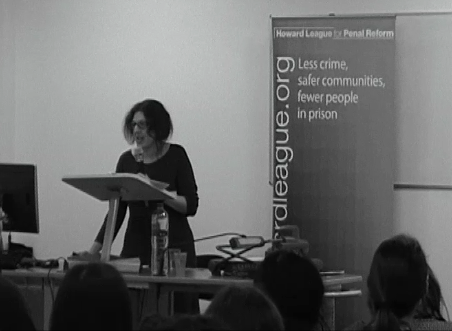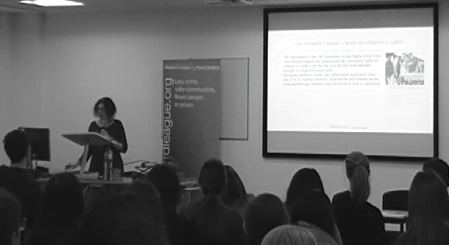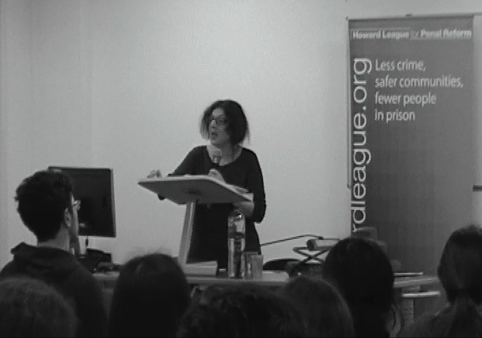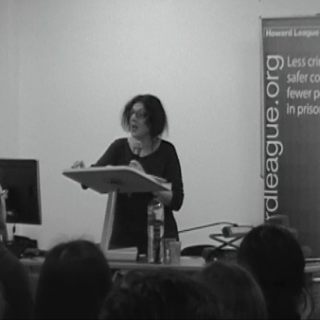Hard to believe a year has rolled around again so soon since my last visit to the RebLaw Conference (see my previous write-up: RebLaw 2018). The RebLaw Conference, started in the UK in 2016, is a conference for ‘radical lawyering’, shining a spotlight on the legal issues of the day while ‘challenging hierarchies of class, wealth, race’ and others. This year’s conference covered a diverse range of topics including women’s and children’s rights, prisons, homelessness, immigration and air quality. Its timing is pretty good, with a general election on the horizon and the legal sector entering a severe crisis of confidence.
I attended the Sunday sessions, which consisted of a Keynote speech by Dr Laura Janes, workshops ‘Tough on Crime?’ and ‘(Un)Intentionally Homeless’, and finally the Plenary session celebrating 70 years of Legal Aid in the UK. It was a full day, but the time seemed to go quickly, the content was engaging, and gleams of radicalism shone through. The speakers were excellent, the shared knowledge informative and it was inspiring to see the hard work and dedication of campaigners and lawyers at the coal face of social justice. This post and others (see RebLaw Workshops: A morning focused on prison reform and housing) , contain my notes and photographs from the conference, RebLaw 2019.
KEYNOTE: Dr Laura Janes, Legal Director of Howard League for Penal Reform

Dr Janes opened with the quote ‘If you are not outraged, you are not paying attention’. With the audience instantly engaged, she told us how she would be dealing with her keynote, tackling in turn, how to solve injustice, the limitations of the law, successes and failures of 30 years of the UN Convention on the Rights of the Child (“UNCRC”), and finally ‘thinking big’.
Dr Janes started us off with a reflection from her youth. She was travelling in Greece in 1998 when a devastating earthquake hit Athens, killing 100, substantially in the poorer tenements on the edge of the city. She was shocked and horrified at the indifference to the plight of the poor, which she felt again more recently following the Grenfell Tower fire disaster in London. The deep inequality and divisions she saw earlier on in her career remain and are ‘not going anywhere’; their signs are all around, every day. A socially-minded way of doing things has been ‘replaced by a harsh ethos’.
Growing up in East London, Dr Janes saw firsthand the effects of racism in her community, such as the death of the local hairdresser killed in a petrol bomb attack on his house. With her mother, Dr Janes went on protests and campaigned against racism. At school and university she continued to campaign and protest on issues like student fees and Pinochet’s attempted flight, became engaged with policy and politics through Young Legal Aid Lawyers (“YLAL”) and assisted on the international stage fighting for asylum and immigration rights for those fleeing from brutal dictatorial regimes, notably Burma.
However, Dr Janes became ‘frustrated’ with her campaigning activities. She felt that ‘telling people what to do or not to do’ didn’t work, but felt that the law could. Dr Janes went on to work at Doughty Street Chambers for 10 years, pupilling under Edward Fitzgerald CBE QC, and working with him on cases like civil rights in Burma and death row cases in Trinidad. She worked in both the domestic and European courts, trying to change things, especially prison law. She found you can win battles but not always the war. Law can drive change, but it isn’t always enough.

Dr Janes now works for the Howard League for Penal Reform (“HLfPR”), established in 1886 and the oldest prison reform charity in the world. She states: ‘we do our best to change the law’. Quotes from Winston Churchill, in 1910, and Lord Simon Brown, in 2014, acknowledge that the way a society treats its prisoners is a measure of it, especially because the risk of abuse in such controlled environments is omnipresent. Dr Janes’ specialist subject is children in the prison system. Reports have shown time and time again that there is appalling abuse, and risk of abuse, of children in the prison system. She presented the audience with a number of disturbing statistics, including self-harm amongst child prisoners up 40% on the year before, the number of assaults on children up 29%, and over 1,000 accusations of sexual assault between 2010 and 2018.
Dr Janes recalls one incident where she was representing a child client in prison, and the prison officer told her (for being a bit cheeky apparently) that he ‘would not put your name on the [prison visitor] list’. Later, that same officer was shown on CCTV to have restrained her child client in an extremely dangerous hold. Dr Janes says that this illustrates the level of unchecked control staff have over the prison and child prisoners.
This is the 30th anniversary of the UN Convention on the Rights of the Child (“UNCRC”), the most ratified treaty in the world (all except the US signed) but also the most violated. The Convention has 54 Articles, dealing with the civil, political, cultural and other rights of the child. The UK has breached the Convention numerous times, such as by setting the age of criminal responsibility low at just 10 years old.

The HLfPR has been instrumental in a number of cases involving children and the prison system, including:
DT(1) v Secretary of State for the Home Department [2004] – the case involved the detention of girls in adult women prisons. DT argued that she had been placed there unlawfully. Because the UK had made a reservation regarding that particular Article in the UNCRC, the court could not find for the complainant, but gave a strongly worded judgment for change. The detention of girls in women’s prisons has since been prohibited.
R(K) v Parole Board [2006] EWHC 2413 (Admin) – K was 14 years old and involved in the parole process. His parole was rejected on a paper review. K argued for the right of children to be heard, using the framework of common law procedural fairness and EU Fundamental Rights, because the UNCRC has not been incorporated into UK law. The court found that K must be given the opportunity to heard, with adult supervision, at a Parole Board hearing. The judgement was then used to lobby the Parole Board, so that now children are entitled to an oral hearing as of right.
R(AB) v Secretary of State for Justice [2017] 4 WLR 153 and [2019] 4 WLR 42 – AB was a child prisoner who was put in solitary confinement (’22 hours per day alone in a cell without contact or stimulation’) for 55 days. AB argued that this was a breach of his Article 8 rights, with which the County Court agreed. However, on appeal, the High Court found that solitary confinement was ‘not degrading’ and therefore there was no breach of any ‘substantial’ Article 8 right. The case is currently awaiting a hearing in the Court of Appeal. Although the case has not yet been won, the publicity around the case raised the profile of children’s rights in prison with the media, bodies like as the General Medical Council and Royal College of Paediatrics and Child Health have issued strong statements against the practice, and a Parliamentary inquiry has been called.
Dr Janes then gave the audience some top tips for ‘Lawyering to Make a Difference’:
- Pay attention, maintain outrage;
- Bring a human perspective to the legal problem ;
- If it doesn’t feel right, it probably isn’t;
- Start from first principles, and don’t forget history;
- Be creative, collaborative and tenacious.
On her third and fourth points, Dr Janes expanded a little. If you see a legal issue, and your gut tells you ‘That just can’t be right!’, you need to investigate further. Drawing on her experience, Dr Janes tells us about a case with Fitzgerald QC relating to a murder involving a Chechen general. Murder, in English law, requires ‘unlawful killing with malice aforethought in the Queen’s peace’. Fitzgerald QC sent Dr Janes off to look into the meaning of ‘the Queen’s peace’. Initially thought to be a question of jurisdiction, the legal history of the definition revealed that the phrase related to whether the State was at war or not. The story illustrates the importance of working from first principles and looking at the history of laws, by, for example, reading Hansard. It may reveal that the interpretation of the law has taken a wrong turn. ‘Leave no stone unturned, never give up.’

Dr Janes provided a healthy reminder that radical lawyers must be sure not to burn out. Legal Aid lawyers are exposed to raw trauma on a daily basis. Look after yourself! Then there is knowing enough so that you can give the best legal support to your client. The process must be ‘person-led’, and therefore you should not look at the client’s problem solely through a legal lens. When working for a client you need to
Dr Janes spoke of her involvement with the Legal Action Group (“LAG”), which is a 40 year old access to justice charity. Their publication, ‘Legal Action’, provides ‘high quality legal information’ in the form of law and practice updates on areas of law important to social practitioners. As part of her work with LAG, Dr Janes has been involved in the publication of children’s storybook-cum-educational tool ‘Equal to Everything: The Story of Judge Brenda’, with the assistance of Lady Hale who was ‘happy to go along with it’. The storybook tells of a group of school children being shown round the Supreme Court by Judge Brenda (aka Lady Hale), providing a vision of the rule of law, justice and the importance of the judiciary in democracy. The purpose of the book was to move away from reacting to events and instead, setting the tone, providing a positive vision for the judiciary of tomorrow.
Read the next installment: RebLaw Workshops: A morning focused on prison reform and housing…

James AC MacDonald is a recent graduate from City Law School, having completed his BPTC LLM there in 2019. His legal interests are centred on housing and environmental law. Follow him on his journey through the law on Twitter at: @ac_macdonald.

